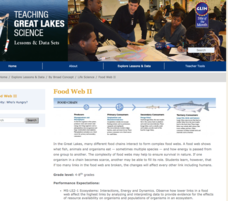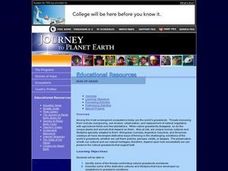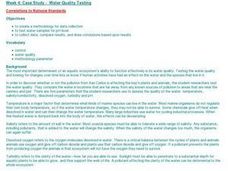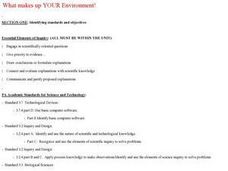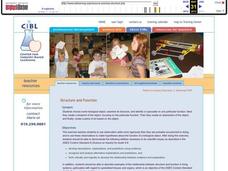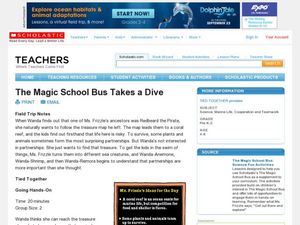Alabama Learning Exchange
Endangered Species: What Are They And How Can We Help Them?
Students research endangered species online and prepare a presentation identifying species, and the reasons why species are becoming endangered,
Curated OER
Eco Points Score Card
Students play a game in which points are assigned to daily activities which require fossil fuels or electricity. They compare the impact their energy and transportation choices have in everyday life.
Curated OER
Climate Change
Students discuss problems associated with a world climate change. They examine how animals would be affected if the world heated up.
Curated OER
Microorganism Multiplication
Sixth graders conduct experiments with yeast to study characteristics of microorganisms. They, working is small groups, change the variables in the experiments and note the results which they later discuss as a class.
Curated OER
Something Fishy Going On
Students create a video animation of how Swimmy gathered his fish friends together to form a great big fish that would frighten the predator tuna away. In art class each child create a small red fish which gets displayed in the ocean...
Michigan Sea Grant
Food Web II
A food web consists of complex food chains and the more complex the web, the better likelihood of survival. Learners compare and contrast food webs and food chains and discuss concepts like the predator-prey and consumer-producer...
Curated OER
Seas of Grass
Students view a video clip about grasslands. They identify threats to grasslands and describe cultures which have adapted to grassland conditions. They discuss possible solutions to preserve grasslands as well.
Curated OER
State of the Planet's Wildlife
Students view and discuss a video about the challenges facing wildlife on the planet Earth. They define key terms, watch the video, and answer discussion questions about the film.
Curated OER
Nutrition: It's In Your Hands
Fourth graders use this lesson to focus on their health, nutrition and the state of the environment. In groups, they examine the various types of land, water and air pollutants and compare and contrast a food chain with and without a...
Curated OER
Dangerous Air
Students investigate how pollution is a global issue. They locate the countries affected by radiation from Chernobyl, sequence the progress of radiation transport from Chernobyl and plot the pollution points on a world map, and read and...
Curated OER
Not So Neutral Views
Students explore ways to use indicators to distinguish between acids and bases. They conduct an experiment to model and discuss the harmful effect of acid rain in our living and non-living environment.
Curated OER
Water Quality Testing
Student explore factors affecting ecosystems. They test local water samples for pH level. After creating a methodology for data collection, they collect data, compare results, and draw conclusions based upon results.
Curated OER
I Know What I Am... but, What Are You? (Classifying Living Things)
Learners examine how to classify living things by effects, environment, and activity. They explore various websites, develop a list of facts they learn about classifications, and participate in a distance online learning session with the...
Curated OER
Landfills: A Solid Waste Management Plan
Young scholars are able to list the types of household waste that they produce daily. They are able to describe some other types of waste that are produced by industry or agriculture to help maintain their lifestyles. Students are able...
Curated OER
Relative Dating-Telling Time Using Fossils
Students explore how to read fossil range charts. They develop an knowledge of the strengths and weaknesses of the fossil record. Students become familiar with the concepts index fossil and fossil range. Students use bar graphs to...
Curated OER
Salmon Vs. Dams: the Dam Removal Debate on the Elwha River
Learners role-play a meeting of the Elwha River council in which they present opposing views to council members on hydroelectric power and salmon fisheries resources. They brainstorm possible conflicts between various people in land-use...
Curated OER
Finding Sources of Air Pollution
Students locate on a map the potential areas of air pollution in their community. They identify the possible sources and types of air pollution in the community based on observations and predict and locate on a map potential areas of...
Curated OER
What makes up YOUR Environment!
Students create their own land or water environment. They make their environment livable for all the different animals they collect to put in it. Students research the types of animals that they can have in their environment, and how...
Curated OER
Structure and Function
Structure and Function
SynopsisStudents choose some biological object, examine its structure, and identify or speculate on one particular function. Next they create a blueprint of the object, focusing on the particular function. Then...
Curated OER
Ecosystems Connect
Students investigate ecosystems near their school and across the world. They examine both living (biotic) and non-living (abiotic) elements of each. They recognize ecosystems from various continents around the globe. The use of computers...
Curated OER
Cloning
In this cloning worksheet, students will read a paragraph about how cloning has been a benefit to medicine and agriculture. Students will underline the main idea in the paragraph and write down three supporting details. Then students...
Curated OER
Sponges, Cnidarians, Flatworms, and Roundworms
In this simple animals worksheet, learners read information about sponges, cnidarians, flatworms, and roundworms and then complete a chart comparing and contrasting these groups of animals. This worksheet has 11 fill in the blank questions.
Curated OER
The Magic School Bus Takes a Dive
Students learn along with Ms. Frizzle's class. In this Magic School Bus lesson plan, students find out how partners can help run a race just as Wanda learns that survival on the coral reef often depends on cooperation.
Curated OER
What's Your Genus? Scientific Classification and the VT
Students learn about binomial nomenclature, the scientific system of classification. In this scientific classification lesson, students work cooperatively to complete a binomial scavenger hunt using the internet and a Visual Thesaurus....





